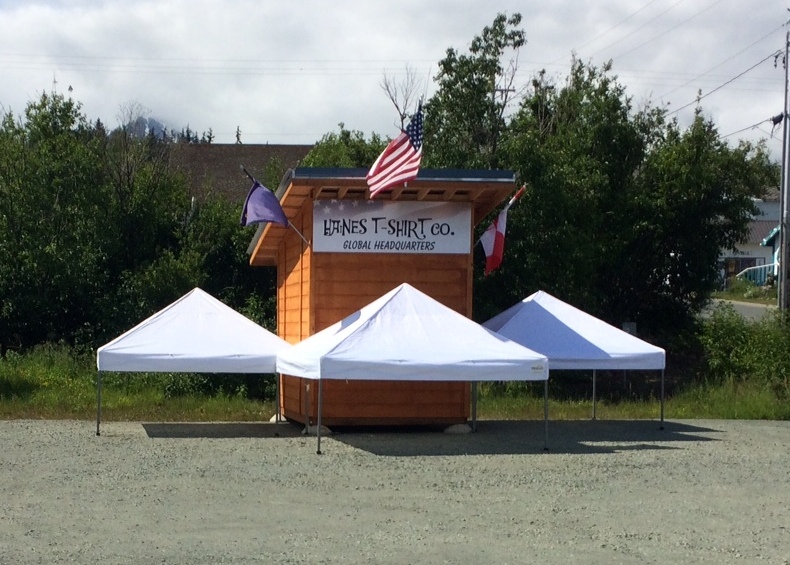
This seasonal shop is one of a handful that have recently popped in Haines. (Jillian Rogers)
How should Haines regulate mobile businesses, like food trucks and pop-up shops? That’s the question a new committee is tasked with answering. The committee met for the first time Friday evening. It was clear from the beginning that members have differing opinions on how lenient Haines should be.
This summer and last, new mobile businesses sprung up around Haines. They include a scooter rental business, a souvenir shop, and most recently, a taco truck. Haines Borough Code has very little to work with when it comes to businesses like these. So far, the trailers have been permitted to operate without much regulation.
“It’s an issue that we’re not addressing that obviously we have out there,” said Assemblywoman Diana Lapham.
Lapham is one of four people on the committee so far. The others are planning Commissioner Heather Lende, Chamber of Commerce board president Kyle Gray and business owner Nelle Jurgeleit-Greene.
A section of Code that allows for temporary structures has been applied to permitting for commercial trailers right now. But Lende says that language was supposed to refer to things like construction trailers, not businesses.
“I would argue a business isn’t temporary,” Lende said.
“Big Al’s [Salmon Shack trailer] is temporary,” said Mayor Jan Hill. “He opens in the summer. He closes in the winter.The scooter guy, he’s temporary, he leaves.”
“But that’s not temporary if it’s permanent. It’s seasonal,” Lende replied. “Big Al’s isn’t [there in the winter] but it could be parked there. There’s nothing that says it isn’t. Any more than the hotel is temporary because it closes in the winter.”
After some back-and-forth, the committee decided coming up with a definition for temporary structures should be one of the tasks on its list.
Haines resident Tom Morphet presented another concern. He asked, what about the business owners who invest in buildings that they have to pay property tax on and maintain year-round?
“And they make their money in the summertime. And in the winter, they lose money,” he said. “So it’s important to them in the summertime to make a lot of money so they can stay open sometimes year-round. And they used to stay open year round. Now the evolution is the trailers have come in and they make a little of that cream that used to keep those structural restaurants open in the wintertime.”
Morphet urged restraint when allowing mobile businesses. He suggested permitting businesses for a limited time period, and incentivizing them to move into permanent structures after the permit expires.
“This benefits the public by then you have investment in your town, buildings being built, no more empty buildings on Main Street,” Morphet said.
But Lapham said that might be too restrictive.
“To me, I’m not dictating to them their businesses,” she said. “I don’t do that to established businesses, I don’t want all those unnecessary rules and regulations.”
Chamber representative Gray said Chamber members are supportive of fostering business growth. Allowing for commercial trailers might give aspiring entrepreneurs a more affordable way to start a business.
“But they don’t like the idea of somebody being able to open a food cart right next to a restaurant or right next to a retail store,” Gray said. “So I think if it were in the proper location, it would be fine.”
Business owner Jurgeleit-Green agreed that it’s important to restrict how far away from brick-and-mortar businesses commercial trailers are located.
“It bothers me that I am now probably gonna be in competition with many people just popping up because we have no regulations,” she said. “So yes. I am all for regulating how these pop-up things happen.”
There are a couple avenues the committee briefly discussed that could be explored further at future meetings. They include locations where trailers are allowed, limiting the number of permits, and coming up with a long-term economic plan for how to handle mobile businesses.
The next committee meeting is July 11 at 5:30 p.m. Mayor Hill says the group needs two more people to join: a restaurant owner and another resident.









Best thing would be to increase visitor traffic. More dockings, more sking, more everything, and this would not even be an issue, tired of this crap.